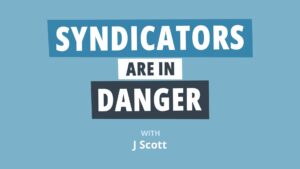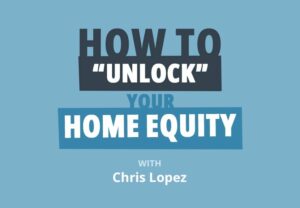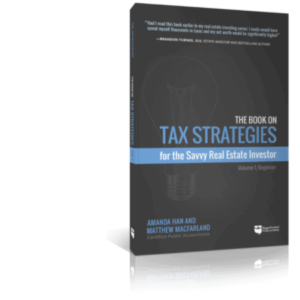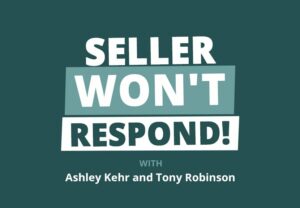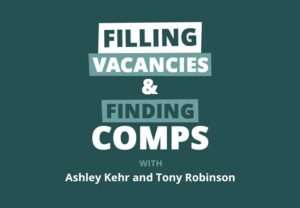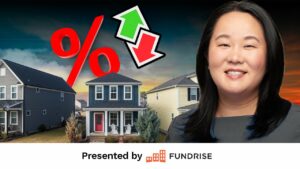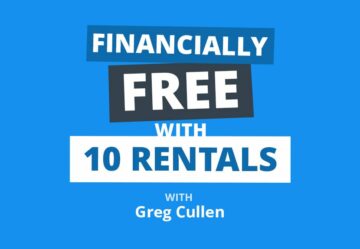
One couple is building MASSIVE passive income and generational wealth by buying rental properties for zero dollars out of pocket, sometimes with zero percent interest rates. It sounds too good to be true, doesn’t it? Well, if you’re willing to get a bit creative, you too can build a real estate portfolio that will lead you to hundreds of thousands of dollars a year in passive income, even if you start with little money or experience.
Dedric and Krystal Polite are wholesalers, buy and hold rental investors, house flippers, business builders, and, most importantly, husband and wife. After reading the personal finance classic Rich Dad Poor Dad, Dedric had a vision to become rich. It wasn’t until Krystal came into his life that he finally took the steps to realize that dream. Now, they own a massive income property portfolio and host A&E’s 50/50 Flip.
In today’s episode, you’ll hear how Dedric and Krystal started with no money, no passive income, and no business knowledge, how they built up their first wholesaling business, how they transitioned into rentals, and the new business they’re investing in that could make them millions. Plus, they give some solid tips on how to invest with a spouse and the question you MUST ask your partner now to make sure they’re willing to build wealth with you.
Click here to listen on Apple Podcasts.
Listen to the Podcast Here
Read the Transcript Here
Henry:
Welcome to the BiggerPockets Podcast, show 868. What’s up everybody? I’m your host, Henry Washington, and I’m here with the bad boy of real estate, Mr. Rob Abasolo. What’s up my friend?
Rob:
That’s right, the bad boy and the birthday boy of real estate.
Henry:
Happy birthday! How old are you?
Rob:
I’m 34. So I thought it’d actually be really great if we started the show with you telling me your favorite 34 things about me.
Henry:
Yes. Starting down the list, my 34th favorite thing about Rob is that he isn’t going to make me do all 34 of these.
Rob:
No, no, I’m not going to make you do that, but we do have a killer show today where we’re going to be talking to two investors, Dedric and Krystal Polite, who have such a great name, but they’re also active investors in North Carolina, Virginia, and Massachusetts. And they also just so happen to be the stars of A&E’s 50/50 Flip. Today we’re going to be discussing how they’re using their real estate business to fund their other insanely profitable businesses. So stay tuned for that.
Henry:
We are also going to be discussing how they’ve pivoted their real estate business in this more volatile, risky market. I like to call it taking what the defense gives you, and we even get a little bit of advice on how spouses can work together.
Rob:
Something new we’re going to be trying this year is putting everyone’s favorite show into a segment at the end of every single episode, Seeing Greene. After this interview, David Greene and I will be taking a listener question about private money and if it’s a good tool for your first investment.
Without further ado, let’s bring in Dedric and Krystal Polite. Dedric, from our understanding, you were the one that was really interested in real estate. When did you get into the game?
Dedric:
I got into real estate in 2001. I read Rich Dad Poor Dad, and I bought my first house in 2007.
Henry:
I was like, “Rich Dad Poor Dad. What’s that?”
Dedric:
Exactly.
Henry:
Is that something I should put on my reading list?
Dedric:
Yeah. Well, it actually goes all the way back to Carleton Sheets in the ’90s. My mom ordered one of the infomercials. She saw it on the late night. And as a teenager, I would watch these VHS tapes and dream about the fancy cars and the big mansions and the real estate riches as a kid. Never thought I could actually achieve it myself because it was just so farfetched at the time, but that’s when the seed was planted.
Rob:
That’s amazing. And Krystal, how did you get on board with Dedric’s vision of being a real estate investor?
Krystal:
How did I get on board? I got sick and tired of hearing him talk about it is how I got on board. When I met him, he had nothing but books and VHSs and tapes of real estate all throughout his house, and he talked about getting into real estate one day, and he just kept talking about it. And fast-forward, I was like, “Listen, I’m a doer, so if you’re going to keep talking about it, we’re going to do it.’ And he was like, “Okay, yeah, yeah, we’re going to get into it.” And then nothing, like silence. So I then jumped into it. If you’re going to get me to read and stuff, then we doing it at that point.
Rob:
I’m curious, at this point in your marriage and career, are y’all both pretty clued into every single real estate deal? Because my wife will look at my calendar and she’ll be like, “Hey, you’re closing on a house today?” And I’m like, “Yeah, I forgot to tell you I bought a house.” And she’s like, “Thanks for letting me know.” How’s that with you guys? You guys know, are pretty clued in?
Dedric:
Yeah, I mean, we’re partners. So she handles the marketing and the branding and the personnel side of the business. I handle the acquisitions, dispositions, the financing and all of that. So we’re very much clued into everything that goes on in our real estate ventures.
Krystal:
I would say on the wholesale side, not so much. So I don’t really pay attention to a lot of the wholesale deals that come throughout the company. I’m more so interested in all of our buy and holds. So if it’s something that we’re going to hold long-term, then that’s what I want to be notified about. That’s what I want to know. A lot of the wholesale deals, I don’t really know until he’s like, “Oh yeah, I got to go deposit this check.” Or, “Oh, hey, yeah, we wholesaled a couple deals this week.”
Henry:
Yeah, I don’t want my wife to see this episode. We closed on a house yesterday that we were selling and she was like, “I didn’t know we bought it. So that’s news.” But in all seriousness, I literally wouldn’t be where I’m at from an investing perspective without her support. It’s just that she’s not involved in the day-to-day as much anymore.
But I often see that a lot of people who have great success in real estate do so because of the foundational relationship they have and the trust that they have in each other. And so you talked a little bit about what your roles are. Can you go into a little more detail? So what are each of you handling in your businesses?
Dedric:
So from a high level, she’s the visionary, I’m the integrator. She’s a serial entrepreneur, she casts a vision and my job is to go and execute it. So when you go look at the strategies and tactics, for example, all of our buy and holds, Krystal’s over property management. We originally were self-managing, now we have managers that she manages for our rental properties, our apartments, our mobile home parks, and also our short-term rentals, our Airbnbs. And on my side, I handle the acquisitions, the dispositions, the financing.
Rob:
Well, actually, do you think you could just tell us what is the difference between acquisition and disposition for anyone at home that may not be familiar with those terms?
Dedric:
Oh, yeah. So acquisitions is the buying of the property. It’s literally acquiring it, getting it under contract, closing on it. That’s acquisitions, and then dispositions is the selling. So it’s literally if you’re doing a fix and flip, it’s selling the property. Or if you’re doing a rent-to-own or other creative strategies, or renting it, that’s the dispositions.
Rob:
Very cool. And so you handle that side of it. And then is there ever a handoff to Krystal or is she pretty much just on the strategy side?
Dedric:
Well, we have a team. So I oversee our acquisitions managers and our disposition managers. And then-
Krystal:
And I really take care of the marketing and oversee who’s handling what marketing because of depending on what we’re wanting to buy at the time, right? So depending on how the market looks, is how our marketing is going to be affected. So I handle that aspect of it.
Henry:
Asking for a friend, what kind of marketing are you seeing that’s working the best right now?
Rob:
Please tell us in excruciating detail.
Krystal:
Asking for a friend, what’s working right now, I would say because of how the market is going, we are finding a lot of creative financing deals is what is what’s keeping us in the game. So yes, we do fix and flip houses. No, we are not doing them right now because we are not crazy. People who are making the money right now, construction teams, the wholesalers. So for us it’s more so creative financing. We target that silver segment, what we like to call that silver segment of individuals. And that’s what’s keeping us in the game right now is that segment.
Rob:
What is the silver segment? Is that a specific-
Dedric:
So those are elderly, over-65 individuals. We know over the past three years since COVID, the market has run up 50% nationwide whether you made any repairs to the house. So it’s been a ridiculously tough market for investors, whether you’re a new investor or experienced, to get deals.
So that’s why when Krystal mentions creative financing, that’s a way you can offer the seller retail, even more than retail, if they’re able to accept payments over time versus if you’re a wholesaler, a flipper and you’re just coming in with a 70% times ARV minus repairs and you’re getting hammered with nos and you’re feeling dejected. That’s how we’ve been able to pivot and still close deals consistently.
Krystal:
Yeah, and we all know houses right now are sitting on the market. They’re not moving. So this is a great time now to even approach ones that are even on the MLS saying, “Hey, listen, your house has been sitting for 200 days. Let’s think of something more creative.”
Henry:
So I’ve heard a few things. I’ve heard you talking about buy and holds. I’ve heard you talking about creative finance. I’ve heard you talk about fix and flip. I’ve heard you talk about wholesale. Can you paint a picture for us of what your business looks like? Your marketing deals come in and then you’re dispositioning them, but what does the business as a whole look like? What are you doing?
Dedric:
So we believe in the multiple streams of income approach to investing. If you’re just a wholesaler, you only have one tool in your tool belt. We love wholesaling. That’s actually how we got into the business because we didn’t have a lot of money when we first started, but you have to know multiple strategies because what if wholesaling doesn’t fit that particular situation? There’s fix and flip. So we wholesale, we also fix and flip. We also buy and hold.
In addition, we do Airbnbs or short-term rentals because what we found with a lot of our single-family rentals was that the cashflow was minimal, 3, 400 bucks a month. But if we did a short-term rental strategy, we can cashflow 1,000 to 2,000 a month off one single house. So we’ve converted a lot of our single-family rentals into short-term rentals.
And then in addition to that, layering on the creative financing has allowed us to close more of the leads that come in because we all know that 99% of offers you make at a wholesale price are not going to get accepted. But when you can offer them retail and then structure the terms creatively, you’re going to close a lot more deals.
Henry:
So correct me if I’m wrong, you’ve got a marketing arm that Krystal is handling and that marketing is bringing in leads for multiple types of dispositions. And then you guys will evaluate those leads and then maybe make one to many offers depending on how you can service that lead. And then you’ll disposition or monetize that lead based on those strategies.
Dedric:
You got it, Henry. You got it. Everyone, every seller gets two offers, sometimes three or more offers. They’ll get a cash offer, they’ll get a creative finance offer, and maybe another type of creative finance offer as well. So that allows us to close a lot more deals versus just being a one-trick pony, wholesale, fix and flip.
Krystal:
And we learned that over time. We learned that when I was bringing in a ton of leads and when Dedric was in the marketing, they weren’t falling and a lot of them weren’t biting on these wholesale deals. And I said, “Listen, I’m doing too much work on my end to bring these leads in. I need you to close some of them.” So I had-
Dedric:
More of them.
Krystal:
More of them. So I had to tell him, “Listen, you got to hone in on creative financing.” So I told him, “From here on out, all leads get two offers. I don’t care what it is.” And from that point on, I’m going to say at least 98% of our portfolio is structured creatively.
Henry:
That is brilliant, absolutely brilliant. One of my mentors called this respecting his leads. He felt like leads weren’t respected unless you were exhausting every option you could to help the person who brought that lead, to get that there.
And the idea is that you’re wasting your marketing dollars and efforts if you’re not effectively offering all of the solutions you can to try to help that person in that situation, so that A, it gives the proper amount of help to the people who are needing it, and B, it allows you to build your business as well.
And I think a lot of times in this industry, people are taught an exit strategy before they’re even taught how to go find a deal. You hear it all the time, I’m going to be a flipper, I’m going to be a landlord, or I’m going to be a short-term rental host. And what really matters is can you find a good deal and then can you monetize that deal?
And truly, if you find that deal, you’re able to monetize it in the way that makes the most sense for you and your business. But having more tools in your tool belt allows you to be a more effective handyman. I love it.
Rob:
Clearly, Dedric and Krystal have honed the art of finding and monetizing a deal, and we’ll break down the details of how they do this right after the break.
Henry:
Welcome back, we’re with Dedric and Krystal Polite who just shared their highly diversified portfolio approach to investing. Now let’s jump back into how they’re financing some of these deals and sometimes at 0% interest.
Rob:
I love it. Yeah, it’s really smart. And you’ve mentioned creative finance quite a bit here, and that’s obviously the idea of going and buying a house unconventionally, typically without the use of a bank. So when you’re doing these types of deals, obviously you’re presenting the wholesale cash price to your buyer, which obviously can have a little bit of a shock effect whenever they’re like, “Wait, how much do you want to give me for this?”
Krystal:
Right.
Dedric:
“Get out my house. No,” that’s what they usually say.
Rob:
Exactly. And then when you’re presenting the creative finance side of it, I imagine there’s a bit of an education that’s needed with these types of leads to get that one to the finish line.
Dedric:
There is some education. So how you typically structure it is say it’s a $250,000 house, you as a fix and flip or a landlord, you’re like, “All right, well, based on the max allowable offer formula, I need to pay 120 for this, for this deal to make sense.” They’re not going to accept 120 unless they’re in dire straits, right?
“Okay, Mr. Seller, or Mrs. Seller, I can give you $250,000 for this property. You have no mortgages. No liens, correct? This is how we’ll structure it. I’ll give you $10,000 down. There’ll be a balance of 240. What we’ll do is we’ll do a promissory note and a deed of trust or a mortgage, and I’ll make you monthly payments of $1,000 a month for the next 5 to 10 years. How does that sound?”
“Oh, that’s interesting. I didn’t know you could do that.”
“Yeah, it’s very simple.” And that opens up the conversation, and then again, you educate them and it’s a smooth transaction.
Henry:
When you are presenting it like that, are you sometimes presenting it as 100% principal pay down?
Dedric:
Good question. So again, when we first present it, we don’t mention interest. We just say payments. And we’ve structured a lot of deals where it’s just 3 to 5% down, sometimes less, and then monthly payments, 0% interest, because some sellers don’t even care about interest. They’re like, “Look, I’ve been a landlord for 30 years. I’ve paid off this property. I’ve squeezed all the juice out of the orange. Now you’re giving me another bite at the orange because you’re going to make me payments. I just care about the income stream.”
So we’ve had a lot. And sometimes they’ll say, “Oh, well, what about the interest rate?” And we’ll say, “Okay, well, we’ll negotiate the interest rate.” And they’ll make even more that way.
Rob:
Now, you mentioned something about these homes being already paid off, which is interesting to me that you’re able to land these deals. I imagine it’s because you’re going for the silver segment. The older generation, in general, they have high equity or paid-off mortgages. Is that why you’re getting so many of these types of leads where the mortgage is already paid off?
Krystal:
Yes.
Dedric:
Yeah. That’s what we focus on. We go for paid off, no liens, free and clear. And again, most of these are tired landlords that have owned these properties for 10, 20, 30, 40 years. They’re tired of being landlords. They’ve paid it off. They’ve put their kids through college. They’re 70, 80 years old. They’re not chasing tenants and toilets anymore, but they’re used to living off that income stream. So if you can continue to keep that income coming in for them, but they don’t have the management headaches because you now own the property, it’s a beautiful win-win situation.
Krystal:
Yeah, that’s typically all they care about at this point is that continuous stream of income.
Rob:
So if I’m hearing this correctly, I mean pretty much, obviously, it’s creative finance, but the niche within this that we’re talking about is just a straight seller finance deal, right? The owner is acting as the bank here.
Dedric:
Yeah. And again, we’ve done subject-to, but that’s a more complicated advanced transaction. We prefer seller finance. It’s a lot cleaner and easier to do.
Rob:
Yeah, I just did a seller finance deal here in Houston, and the owner had it paid off. He didn’t want to pay capital gains tax, and he sold it to me for … He wanted 5% interest, and I told him … He was an investor, and I was like, “Look, as an investor, you know that this deal loses money at 5%, but at 3% I’ll make a little bit of money and I’ll do that deal.” And he was like, “All right, sure.” He didn’t really have much of a leg to stand on. And so super easy transaction, went to the title company, they did the paperwork, and it was weirdly just the easiest transaction that I’ve ever done.
Krystal:
Yeah.
Dedric:
Yeah, if you think about it, people are used to making payments. You think about your cell phones, when you go to buy a new iPhone, you don’t drop 1,500 bucks on it. They’ll go, “We can just upgrade you and add it to your plan, just 35 bucks a month for the next thirty-six months.” It’s the same thing with houses, you just structure payments over time.
Krystal:
And the great thing about it from us is we don’t put down that down payment. So when we tell people like, “Listen, we don’t come out of our pocket, anything really on these deals. We really don’t. We even bring in a private investor.”
Dedric:
To fund the down payment and the closing costs.
Krystal:
Yeah.
Dedric:
So a lot of times we get paid to buy these deals because we’re getting them at such good prices and terms.
Rob:
Now, if I understand it correctly, you’ve changed your strategy over the years depending on the market conditions. How have the market conditions influenced the pivots these past several years in your business?
Dedric:
We started out wholesaling. The strategy was to wholesale in order to get capital to buy rental properties and build a portfolio. And then the TV show came calling, they were like, “Hey, we want to do a TV show on you guys. You’re house flippers.” We’re like, “No, we’re not house flippers. We’re buy and hold investors.” So they were like, “All right. Well, we just want to tape what you do.”
And we started flipping houses because the market was so hot, and during that process, we learned seller financing from a mentor and that opened up a whole new world to us and we were able to acquire multiple millions of dollars of single-family homes, small apartment buildings, mobile home parks through seller financing. And that’s how we built our business.
Krystal:
But the end goal is always buy and hold. People will be like, “Oh, you fix and flip.” That is an exit strategy and we probably wouldn’t be doing it if we didn’t had a TV show.
Dedric:
But it’s a good active income. Wholesaling and flipping is good active income while you build the passive income.
Rob:
And so what was that big moment for you guys, Krystal? Obviously you’re doing the wholesaling side of things, obviously you’re the visionary on this. Was this a big moment for you guys to get out of wholesaling and get into the fix and flips? Or what was that light bulb moment for y’all?
Krystal:
To get into fix and flip?
Rob:
Yeah, just to move out of wholesaling, or not focused exclusively on wholesaling?
Krystal:
Well, the focus on wholesaling was only to bring in the capital to buy and hold. So our focus has always been on to buy and hold properties. Wholesaling was the means to get that done. So from the very beginning, every wholesale deal that we closed out, we ended up taking that money and we would take a percentage, put it back into marketing, everything else banked to buy down rental properties. That was it. So we never used it for anything else other than to buy and hold properties because I knew from the beginning what my exit strategy was going to be from real estate.
Rob:
Which is what?
Krystal:
Which is to get into family entertainment centers. Dedric said when we met, he was like, “Hey, we do this real estate thing. That’ll be the means to being able to do your dream, which is to own these FECs.” So I said, “Okay, bet. You got me.” [inaudible 00:18:34]
Dedric:
So that’s how I got her buy-in. Like I said, her dream, her goal is to own a chain of family entertainment centers, and that’s what we’re in the process of doing right now.
Rob:
Okay. Family entertainment centers, this sounds very interesting. That’s your end goal. How did you reverse engineer it so that real estate was eventually going to fund your FECs?
Krystal:
So how we reverse engineered it was we started buying, like we said, from the very beginning, Dedric said, “Hey listen, let’s hold these properties. Let’s build up this equity in the properties. Then we’ll be able to tap the equity, whether we have to sell it, pull money out, what have you, and take that money and roll it into the FECs.”
So that’s actually exactly what we did when we first bought our first franchise, which is Sky Zone. We took what, two, one of our properties that we had held. I think we bought it for … What did we buy Belmont for? 50,000.
Dedric:
50,000.
Krystal:
50,000, exact. Market had appreciated over the next two to three years. We ended up selling it for-
Dedric:
215 after about 50,000 in renovations.
Krystal:
215. We took a portion of that and bought the Sky Zone franchise. Now we have two other properties that are just sitting. The money that we use from selling those properties will be the money that we use to fund the SBA loan.
Dedric:
So most people don’t realize with a franchise like Sky Zone, it’s a 4 or $5 million project, but we didn’t realize that you can get a Small Business Association, SBA loan. And with the SBA loan, you can put down 10 to 20% and then the bank or the government will back the other 80 to 90%.
So once we found that out, we’re like, “Great. We’ll liquidate some properties. That’s going to fund the Sky Zone.” And that type of business spits off about a half a million dollars a year in net profit after everything. So a lot more profitable than even some of these rental properties.
Krystal:
Right.
Rob:
I’ve heard you guys talk about the idea of trading up and trading out before. Tell us what that philosophy is and what it means for your current real estate strategy.
Dedric:
So what that means is, for example, we got two duplexes where there’s about a half a million dollars of equity. So that half a million dollars of equity produces maybe about four grand a month in cashflow. So we look at that, where can we place this equity where it can produce more?
Henry:
So what I want to do is jump back a little bit and define for people who may not know what is an FEC. So what’s that family entertainment center? Because when I first heard it, I thought, “What is that, like an event space?” And then-
Rob:
Henry, let me just say, can I just say I’m really glad you asked that because I was like, “I think I should know what this is, but I’m too scared to ask at this point.”
Krystal:
So an FEC is a family entertainment center. So it’s basically anywhere that you can go and gather and people have different forms of entertainment. So you have Dave & Buster’s, you have Sky Zones, you have DEFYs, you have-
Dedric:
Trampoline parks.
Krystal:
… all types of trampoline parks-
Dedric:
Birthday parties.
Krystal:
Also, amusement parks are FECs. Bowling alleys are FECs. So anywhere you can go and really gather with family, friends of any age is considered a family entertainment center.
Dedric:
And we noticed a gap in our particular city. There’s no family entertainment centers, like none. You have to go an hour in either direction to get to one. So we noticed that gap and we’re filling it.
Henry:
I mean, I would go to Polite Park if that was an amusement park.
Krystal:
Okay.
Dedric:
Don’t give Krystal any ideas because the next thing you know will be buying another franchise.
Henry:
I’m in for Polite Park.
Dedric:
So we put it into a franchise. That half a million dollars is now going to produce, I don’t know, 20, 30 grand a month in cashflow, in net cashflow. So I mean, it was an easy math equation at that point.
Henry:
And you talk about trading up into these FECs and using real estate to do that, and one thing that people like about real estate is you’re able to buy a rental property and then potentially hand that property off to a property manager to help manage it so that you truly do get semi-passive income. Is that the same when you’re buying a franchise or are these businesses that you’re hands on in, in order to get those returns you’re talking about?
Krystal:
So it’s pretty much the same. You can either be an owner-operator or you can be what they consider like an absentee owner. For us, it’ll be a little bit of both. When we first get it, I want to work in it myself probably for the first six months to a year so I can really know what everyone’s job role is and really know the in and outs of the FEC because this is just one of many that I really want.
So I really want to know everything that has to be done, but at the same time, we will have hired a general manager as well. So when I exit, they will enter in my absence and then they’ll start to manage the day-to-day while I go and start looking for my second location.
Henry:
And it sounds like that you are, I mean it’s obvious that you, Krystal, in particular are very passionate about this and so much so that … Did I read it right? You wrote this into your wedding vows?
Krystal:
I sure did.
Dedric:
Yes. It was in our wedding vows.
Krystal:
Yes, sir.
Henry:
So what’s driving that? Why was this particular asset class so important to you?
Krystal:
Good question. I don’t know, I’ve always been passionate about children and entertainment. When I was young, in my early 20s, I was throwing teen parties for teens, just a place where all kids can come together. Then I went from that to trying to open up a teen nightclub and got hit with so many restrictions as to from the city.
But I’ve always been very big on, and at the time I didn’t know they were called FECs, but very big and passionate on giving young people a place to really get together, gather, have fun. And it developed into FECs over time because Dedric, I’ve literally pulled him to probably visiting 60, 70 different FECs since he’s known me.
Because my ultimate goal at the end is to have my own where I’ve developed and designed my own FEC, which he agreed to, by the way, before I said I do. Really, is centered around family entertainment centers and really taking us from that real estate, transitioning us from real estate into another space.
Rob:
Okay, I’ve got several questions. I’m very, very intrigued. First of all, I just want to say the family entertainment center, brilliant idea. There’s nothing that makes me more mad than the fact that there aren’t more places to take your kids in a city. You can go to parks, but in Houston, Texas, when it’s 110 degrees outside, I mean there’s nothing to do, right? And it’s just such a rare, rare, rare thing to find places where you can go and have fun with your kids.
So with that said, I love the business move. I have a couple of follow-up questions here. When we get into the world of FECs, is this a real estate business? Is this a business, because I’m curious when you’re getting into actually purchasing the asset, or do you purchase the asset? Tell me a little bit about that. Do you actually own the building that these are in?
Dedric:
So there are a few different options, Rob. You can lease the building or rent it out. Some people get old Walmarts or KMarts and they’ll retrofit them for the FEC. Some people build them, do a build-to-suit, or you can have a developer build it and then you rent it from them. So there’s various options depending on the territory, the area you want to open up in, looking at the market and what’s available in that market.
Rob:
Okay. So if you’re leasing it, then you basically have a business. If you’re buying the property, it’s a little bit of both, and that’s what I’m getting at because it seems like it’s an expensive or a possibly expensive business to get in.
So tell us a little bit about before you got into the first FEC, how much wealth had you built up through your portfolios that allowed you to do that? What was that moment? Was it a number amount or was it like, “Hey, we’re working towards making this much every month so that we know we can afford this business”? Or did you sell off a piece of your portfolio to do this? Give us a little bit of insight into that whole situation.
Krystal:
So really to get into it, people look at it and you think like, “Oh my God, this is super, super expensive to get into.” And I wouldn’t say that it is, but I definitely would think your net worth would have to be, what?
Dedric:
You want to definitely be an accredited investor, so be over a couple million net worth. Again, it’s a 4 to $5 million project. But the power of the SBA, which is you putting down 10 to 20%, so you don’t have to put down the whole 4 to 5 million, you might have to put down a half a million to a million to pull it off.
Krystal:
And I would say it’s not incredibly impossible. For us, it is more so that’s what some of these properties were for, were literally earmarked for the FEC.
Dedric:
Yeah.
Krystal:
The thing is, when you are an investor and not what people call a wholesaler, but when you are an investor and you’re actually buying these properties, which is what we preach to people. It is great to wholesale, but if you don’t own anything, all you’ve done is gotten another job.
Dedric:
A high paying job.
Rob:
With a high tax bill.
Krystal:
Right.
Dedric:
Yeah.
Krystal:
That you’re going to have to continuously work at. So for us, it wasn’t a means, right? Go in, take down some of these properties. We’re buying them, 30, 40, $50,000, sitting on them, renting them out, letting that appreciation come. And we’re constantly buying, so it’s not like we’re saying, “Oh, okay, we’re done now. Great.”
Dedric:
Yeah, we’ll always do real estate. We’ll never stop doing real estate. This is just adding another layer to our businesses.
Krystal:
So for the properties that we sold off, even for the FEC has already been replaced.
Rob:
Wow. Okay, cool. And I was actually just curious, I mean, you said that it was 4 to 5 million for an FEC, roughly speaking. How does that cashflow compare to about 4 to $5 million of your real estate holdings?
Dedric:
So again, when you’re looking at a business, that business cash-flows higher. I mean, real estate is not get rich quick, as you guys know. It’s get rich slow over time. So again, sometimes you’ll have equity trapped in a property and you’ll be like, “Man, I have a ton of equity, I’m only making 2, 3, 4 grand a month. If I put this somewhere else, I can 10X my cashflow.” But some people get married to the property and they don’t make that move. We’re not married to any property, we’re married to each other.
Krystal:
Right.
Rob:
At this point, I am dying to hear from both of you about your advice on working with the spouse, and I’m sure the listeners are too. We’ll hear about that and their advice for new investors after a quick break. So stick around.
Henry:
All right. So it seems like you’ve done a really great job of having great fundamentals within your real estate business and that has allowed you to pivot when the market has shifted, right? I call it taking what the defense gives you. And so you’ve been able to pivot your real estate business. That’s allowed you to maintain your long-term goal of transitioning and trading up into FECs from your real estate portfolio.
What advice would you give to investors who are just starting out on that front side, they want to start that real estate business or they just started that real estate. How do you suggest they get into that game right now?
Dedric:
My advice would be to start wholesaling. Wholesaling is the art of finding motivated sellers and getting deeply discounted properties. You learn to be the principal in a transaction. And when you learn how to get a property at 50 to 60 cents on a dollar, you don’t have to wholesale it.
You can wholesale it and make a quick payday of 10 to 20K, or you can choose to keep it as a rental property. Why? Because you got it so cheap. You might have to put some repairs into it, but you got it at a really cheap price. Or you can choose to fix and flip. When you learn to wholesale, again, you learn the art of finding and identifying a deal, and then you can utilize multiple extra strategies to monetize that deal.
Krystal:
He who finds the deal holds the power, and the better you can become at finding these off-market deals, the more power you have and leverage you have when it comes to deciding on your exit strategy. And I would definitely say, don’t quit your day job. Everyone wants to get into real estate and people will be like, “Oh, you can quit your day job in 60 days. Oh, you can quit your day job and 90 days.”
Dedric:
Keep your day job.
Krystal:
Listen, stop playing with me. Keep your day job and let that be your first investor. When we got into it, we was very methodical on when we were going to have our exit strategy, our exit plan, and it was not no … I don’t care how much debt you’re going to get into real estate, unless you show me the bank right then, we were not quitting. I wasn’t quitting my job, it just wasn’t going to happen.
But we leveraged our jobs as our first investors and we’re working both 60, 70 hours a week at these jobs, but we utilized that. We kept it as long as we could before, as we started to accumulate these rentals. So I would definitely say if you’re getting into it, start with the end in mind, and it should be not to start another business, which is wholesaling, but it should be to buy and hold something.
Build something that outlives you, that has always been our goal. Build something that outlives you that can literally transcend generation to generation to generation. So if we have only built enough up so that our two sons can benefit, we would’ve failed them. It is their kid’s kid’s kids have to be able to eat off the fruits of our labor. And that’s what we’re doing on the real estate side as well as other ventures in the entrepreneurial side.
Henry:
I love that. I don’t know that I could say much more. I’m just going to let that be.
Rob:
I do have one final question before we hop out of here. I mean, you guys both seem to be so wonderful together as a machine. For anyone at home that’s listening to this, that’s thinking about getting into business with their spouse or already in business with their spouse, what advice would you have for them to be successful in this industry?
Dedric:
I’ll tell you this, it’s not easy being in business with your spouse. It’s not easy, but it’s worth it.
Krystal:
Right. What I would say is you have to start-
Dedric:
You see what I’m talking about? Go ahead, honey.
Krystal:
You have to start before they become your spouse, before they become your boyfriend. The seeds have to be planted then. And most people look at me like, “Wait, what?” On our first date, I asked Dedric, “What’s your credit score?” He said, “Are you an entrepreneur?”
“Yes.”
“What kind of businesses have you done? What have you done in the entrepreneurial realm?”
I asked him, “What are your goals? What have you done to start working on those?” I asked questions that most people don’t ask until it’s seven or eight months in, which in my opinion is too late. “Are you planning on staying in this state forever?”
“Well, I’m not married to it.”
“Okay, good. Because anyone who’s going to be with me has to be willing to move in six months. I’m an entrepreneur. This is what I plan on doing in that area. These are my goals.” And if it was something that he would’ve been like, “You know what? I like working my sales job. That looks too much,” then that would’ve been okay too.
But a lot of people come up to us and they say, “Hey, how can I get my wife in? She’s not really interested.” Or, “How can I get my husband in? He’s not really interested.” And I’m like, “Well, what conversations did you have when you guys were just getting to know each other? Because at this point, it’s like you’re now trying to pull that person along on the journey versus setting that journey together when you first get to know each other.”
Dedric:
Yeah, upfront conversations.
Krystal:
Those upfront conversations can’t be about, oh, what kind of food do you like? Well, it don’t matter to me because I’m not cooking it. Oh, what’s my favorite color? It don’t matter, I’m not buying nothing in that color anyway. I don’t care about any of that, it’s irrelevant. I’m getting what’s your credit score?
He was like, “Oh, I’m a 820.” He was like, “Well, what’s yours?” He was offended of course. “Well, what’s yours?” I said, “580.” Yes, I did. So everybody laugh when I say it, they’d be like, “Oh, you didn’t ask him what’s his score.” And I said, “Listen, that’s right, I asked him, because I’m rebuilding my credit. I can’t be rebuilding both of ours. Somebody got to come with it.”
But I got that information out the way in the beginning. So I tell people, start how you want to finish. Start with that end in mind, even in the relationship. Do not wait until you are in an actual relationship, dating. Definitely don’t wait till you’re married.
But get these conversations out the way because I’m going to tell you, being married to an entrepreneur, for all of us who are actual real entrepreneurs, you know it’s not easy. And when you are a visionary, it’s even harder for people to really understand your vision because even with Dedric, it was hard for me to … When I would tell him we owned other franchises, and I’m like, “Hey, let’s sell.” And he’s like, “What are you talking about? We’re making like 250,000 on this. What do you mean?”
“We need to sell and we need to sell now.” And just out of the blue, me telling him this, because he trusted me and my vision, he was like, “Okay. Well, you say sell, sell.” So understanding that you as an entrepreneur are never going to change, but what you can do is help that journey, help the process, help your future spouse by being really upfront and having those uncomfortable conversations. When you sit down on that first date and you’re getting to know each other, let it be of substance.
Henry:
Preach.
Rob:
Well, thank you. Yeah, thank you both so much, Dedric and Krystal. It has been such a delight to have y’all on the BiggerPockets Podcast. We covered so many things. I think really the highlight of this show is start with the end in mind. We talked about trading up and out. We talked about building something that outlives you, respecting your leads. So many golden nuggets in this.
For anyone that wants to reach out to Dedric and Krystal or Henry and I, all of our contact information is going to be in the show notes down below. And of course, thank you Henry for coming on and co-hosting. It’s always a pleasure to share the mic with you, my friend.
And again, new year, new episode format. Stay tuned as David Greene and I answer a listener question on our first ever Seeing Greene segment right after the break.
David:
All right. Welcome to our Seeing Greene segment where we take questions from you, our listeners, and answer them sharing our perspective so everybody can learn from what Rob and I are seeing.
Rob:
And today’s question comes from our good friend Nick, proverbial friend that is. Nick asks, should I use private money to purchase a house hack soon before prices rise again, while I’m still paying my debts off over the next two to three years?
David:
Some background on Nick so that we can understand his financial position before we get into the question. The average home price in Nick’s area is $350,000 for a three bedroom, two bathroom. He earns about $50,000 a year at his job, plus about $20,000 a year from his side hustle, which is wedding and portrait photography.
Nick is cleaning up the last $10,000 of his debt. Good for you, Nick. And he wants to save another $10,000 for an emergency fund. He’s got stocks that he could liquidate into $13,000 for a 3% down payment on the house were he to buy it right now. And the ideal purchase would be a house hack with a mother-in-law unit or a duplex.
Rob:
Okay. So it sounds like what we need to address here is should Nick act now and buy a home, and is private money a good option to do so? What say you, sir? Do you think he should take private money to purchase his first home?
David:
Oh, that’s going to be a no for me, dog. I’m not a fan of people borrowing money, especially when it’s their first house, especially when they’re young and here’s why.
Rob:
Yeah, exactly what I was going to say.
David:
I like the idea of having to step up your game in some way, especially when you’re young and letting the desire to buy real estate become fuel to make you more ambitious. That’s what it was for me. I knew I wanted to buy real estate, so I started picking up extra shifts at restaurants. Then I went to a better restaurant where I got paid more. This forced me to take my first couple steps of growth within the financial markets and within the marketplace where I was earning money.
And I feel like that was a really, really good way for me to start off my beginning investing career was looking for ways to grow my skillset to buy real estate as opposed to just borrowing money from someone else, potentially losing their money. What do you think, Rob?
Rob:
Yeah, a couple of things. So he’s already in debt and he’s working on cleaning it up. Like you said, kudos to him on that. It seems a little counterintuitive to clean up your debt only to get into debt again. I don’t think anyone should be borrowing money until they’ve really cut their teeth in the industry, understand what good debt is, what bad debt is.
I don’t know what kind of debt he’s in, but if he’s in $10,000 of debt, I’d say cut that out, live life debt-free a bit. I’m not talking about mortgage or anything like that. I’m talking about credit cards and cars, whatever it is he’s trying to clean up. And save up a little bit more money and see if he can get into his first house without debt.
And the reason I say this specifically is because it’s a house hack, and usually when people are trying to house hack, it’s because they’re trying to subsidize their mortgage so that they don’t have to pay a mortgage. And I’m all about that. That is my favorite form of real estate. But usually when people are house hacking, it’s because money is tight anyways and they’re trying to make money a little less tight. And so I don’t love the idea of going out and borrowing money to then get into a house hack where money is tight.
So I’m pretty much going to go no on this. I wish I could offer a little bit more of a, “Hey, you got this. You can believe in yourself and do it, bud,” but not on your first one.
David:
Yeah, absolutely. You will hear us at times advise people that it is a good idea to borrow money. That typically comes when you have a screaming deal with a ton of equity and you can have a quick turnaround. So if I’m looking at an opportunity to make $250,000 on a flip or a wholesale opportunity or just something with a ton of equity, if I borrow money from somebody else, I’m basically borrowing money to buy money in the form of equity. This is different. We’re talking about a down payment of a house that theoretically we’re paying fair market value for, and the purpose of the down payment is just to avoid the hard work of having to keep working and paying off debts.
I’d rather see that we step up the side hustle, ask for a promotion at the job, work harder, do something to put yourself in a stronger financial position before you step into real estate investing. But I do love the idea of house hacking. I love the idea of buying a duplex or a single family with an ADU. I love that delayed gratification and sacrificing comfort for your financial future. What do you think about that element, Rob?
Rob:
I’m glad you said that. Yeah, with a flip, there’s an exit strategy and a timeline where you get out of that debt. With the house hack, you’re pretty much going to do that for a long while, I think.
David:
Now, if you are somebody who has been considering borrowing private money yourself and you want to know more about that, BP has some good resources for you on our website, go to biggerpockets.com and under Build your Team, click Find a Lender, where you can find some information about what you should be looking for in a private lender if this is something that you’re thinking about exploring.
Rob, thank you for joining me on Seeing Greene. It’s always better when I’m seeing Grabasolo instead of just Seeing Greene. So I appreciate you being here.
Rob:
Hey, thanks for having me on.
David:
And thank you all for joining us on the show. We look forward to being here with you next time, where we will have another Seeing Greene element at the end of the regular podcast. If you’ve liked this show, please consider leaving us a five-star review wherever you listen to your podcasts. Those help us out a ton. This is David Greene for Grabasolo signing off.
Watch the Episode Here
Help Us Out!
Help us reach new listeners on iTunes by leaving us a rating and review! It takes just 30 seconds and instructions can be found here. Thanks! We really appreciate it!
In This Episode We Cover:
- The no-money-down, zero-interest creative financing you can use to buy rentals TODAY
- Building multiple streams of income and why you CAN’T just wholesale and flip houses
- Investing in small businesses and building a $500K/year passive income stream
- The real key to creating multigenerational wealth that’ll actually last
- How to know whether or not you should invest with a partner or spouse
- When you should (and definitely shouldn’t) use private money on your deals
- And So Much More!
Links from the Show
Connect with Dedric and Krystal:
Interested in learning more about today’s sponsors or becoming a BiggerPockets partner yourself? Email [email protected].
Note By BiggerPockets: These are opinions written by the author and do not necessarily represent the opinions of BiggerPockets.
- SEO Powered Content & PR Distribution. Get Amplified Today.
- PlatoData.Network Vertical Generative Ai. Empower Yourself. Access Here.
- PlatoAiStream. Web3 Intelligence. Knowledge Amplified. Access Here.
- PlatoESG. Carbon, CleanTech, Energy, Environment, Solar, Waste Management. Access Here.
- PlatoHealth. Biotech and Clinical Trials Intelligence. Access Here.
- Source: https://www.biggerpockets.com/blog/real-estate-868
- :has
- :is
- :not
- :where
- $UP
- 000
- 1
- 10
- 110
- 120
- 20
- 200
- 2001
- 20k
- 24
- 250
- 30
- 35%
- 40
- 400
- 50
- 500
- 60
- 70
- 80
- 820
- 90
- a
- Able
- About
- about IT
- absolutely
- Accept
- accepted
- accredited
- Accredited Investor
- Accumulate
- Achieve
- acquire
- acquiring
- acquisition
- acquisitions
- Act
- acting
- active
- actual
- actually
- add
- adding
- addition
- address
- advanced
- advice
- advise
- affected
- After
- again
- age
- agreed
- ahead
- All
- allowed
- allows
- along
- already
- also
- always
- am
- amazing
- ambitious
- amount
- amusement
- an
- and
- Another
- answer
- any
- anymore
- anyone
- anything
- anywhere
- Apartment
- apartments
- Apple
- appreciate
- appreciation
- approach
- ARE
- AREA
- ARM
- around
- Art
- AS
- ask
- aspect
- asset
- asset class
- Association
- At
- attention
- author
- available
- average
- avoid
- b
- back
- background
- Bad
- Balance
- Bank
- Banked
- based
- Basically
- BE
- beautiful
- because
- become
- becoming
- been
- before
- Beginning
- being
- believe
- below
- benefit
- BEST
- Bet
- Better
- between
- Big
- Bill
- Bit
- Blue
- board
- Books
- border
- borrow
- Borrowing
- both
- bought
- BP
- branding
- Break
- brilliant
- bring
- Bringing
- brought
- build
- builders
- Building
- built
- business
- businesses
- but
- buy
- BUYER..
- Buying
- by
- Calendar
- call
- called
- calling
- came
- CAN
- Can Get
- capital
- capital gains tax
- Cards
- care
- Career
- Carolina
- cars
- Cash
- cell
- cell phones
- Center
- centered
- Centers
- chain
- change
- changed
- cheap
- check
- Children
- Choose
- City
- class
- classic
- clean
- cleaner
- Cleaning
- clear
- click
- Close
- closed
- closing
- College
- color
- COM
- come
- comes
- comfort
- coming
- company
- compare
- complicated
- conditions
- Consider
- considered
- considering
- consistently
- constantly
- construction
- contact
- continue
- continuous
- continuously
- contract
- Conversation
- conversations
- converted
- cooking
- Cool
- correct
- correctly
- Costs
- could
- Couple
- course
- cover
- covered
- Covid
- crazy
- Creative
- Creatively
- credit
- Credit Cards
- curious
- Current
- Cut
- Dad
- Date
- Dating
- Dave
- David
- day
- day-to-day
- Days
- deal
- Deals
- Debt
- Deciding
- deeply
- Defense
- define
- definitely
- Delayed
- delight
- Depending
- deposit
- designed
- desire
- detail
- details
- developed
- Developer
- DID
- difference
- different
- different forms
- dire
- direction
- discussing
- Display
- diversified
- diversified portfolio
- do
- does
- Doesn’t
- Dog
- doing
- Dollar
- dollars
- done
- Dont
- down
- dream
- driving
- Drop
- during
- Dying
- each
- Early
- Earning
- easier
- easiest
- easy
- eat
- educate
- Education
- effect
- Effective
- effectively
- efforts
- either
- Elderly
- element
- else
- emergency
- end
- ended
- engineer
- engineered
- enough
- Enter
- Entertainment
- Entrepreneur
- entrepreneurial
- entrepreneurs
- episode
- equity
- especially
- estate
- Ether (ETH)
- evaluate
- Even
- Event
- eventually
- EVER
- Every
- everybody
- everyone
- everyone’s
- everything
- exactly
- example
- exclusively
- execute
- Exit
- Exit Strategy
- expensive
- experienced
- Exploring
- extra
- fact
- Failed
- fair
- Falling
- familiar
- family
- fan
- farfetched
- Favorite
- feel
- feeling
- felt
- few
- filling
- final
- Finally
- finance
- financial
- financing
- Find
- finding
- finds
- finish
- First
- fit
- Fix
- Flip
- Flips
- Focus
- focused
- food
- For
- For Investors
- forced
- forever
- form
- format
- forms
- formula
- Forward
- found
- Foundational
- four
- Franchise
- Free
- friend
- friends
- from
- front
- Fruits
- Fuel
- fun
- fund
- Fundamentals
- further
- future
- Gains
- game
- gap
- gather
- General
- generation
- generational
- generational wealth
- get
- getting
- Give
- gives
- Giving
- Go
- goal
- Goals
- God
- Goes
- going
- Golden
- good
- got
- Government
- grand
- great
- Grow
- Growth
- hack
- hacking
- had
- Half
- hammered
- hand
- handle
- Handles
- Handling
- Hands
- happen
- Hard
- hard work
- harder
- Have
- having
- he
- headaches
- hear
- heard
- hearing
- Held
- help
- henry
- her
- here
- Hidden
- High
- higher
- Highlight
- highly
- him
- his
- Hit
- hold
- Holdings
- holds
- Home
- Homes
- Honey
- host
- HOT
- hour
- HOURS
- House
- houses
- houston
- How
- How To
- HTTPS
- Hundreds
- i
- I’LL
- idea
- ideal
- ideas
- identifying
- if
- imagine
- important
- importantly
- impossible
- in
- Income
- incredibly
- individuals
- industry
- influenced
- information
- insight
- instead
- instructions
- interest
- INTEREST RATE
- interested
- interesting
- Interview
- into
- Invest
- investing
- investment
- investor
- Investors
- involved
- iPhone
- IT
- iTunes
- Job
- Jobs
- joining
- joining us
- journey
- jpg
- jump
- just
- just one
- Keep
- keeping
- kept
- Key
- Kid
- kids
- killer
- Kind
- Know
- known
- KUDOS
- labor
- Land
- landlord
- Last
- Late
- laugh
- layer
- layering
- lead
- Leads
- LEARN
- learned
- learning
- lease
- leasing
- least
- leaving
- lender
- less
- let
- letting
- Level
- Leverage
- leveraged
- LG
- Life
- light
- like
- Line
- liquidate
- List
- listener
- Listening
- little
- live
- living
- loan
- location
- Long
- long-term
- Look
- look like
- looking
- LOOKS
- Loses
- losing
- Lot
- love
- machine
- made
- maintain
- make
- make money
- MAKES
- Making
- manage
- management
- manager
- Managers
- manages
- many
- Market
- market conditions
- market value
- Marketing
- marketplace
- Markets
- massachusetts
- math
- Matter
- Matters
- max
- May..
- maybe
- me
- mean
- means
- mention
- mentioned
- mentions
- mentor
- mentors
- met
- methodical
- might
- million
- million dollars
- millions
- mind
- minimal
- MLS
- Mobile
- mom
- moment
- monetize
- money
- Month
- monthly
- months
- more
- Mortgage
- Mortgages
- most
- motivated
- move
- moving
- mr
- much
- multiple
- must
- my
- myself
- name
- Nationwide
- necessarily
- Need
- needed
- needing
- net
- never
- New
- new year
- news
- next
- niche
- nick
- night
- nightclub
- no
- None
- North
- north carolina
- note
- Notes
- nothing
- now
- number
- obvious
- of
- off
- offer
- offering
- Offers
- often
- oh
- Okay
- Old
- older
- on
- once
- ONE
- ones
- only
- open
- opened
- opens
- Opinion
- Opinions
- Opportunity
- opposed
- Option
- Options
- or
- Orange
- order
- originally
- Other
- our
- out
- outside
- over
- oversee
- own
- owned
- owner
- paid
- paint
- paperwork
- Park
- parks
- particular
- parties
- partner
- partners
- passionate
- passive
- passive income
- past
- Pay
- paying
- payment
- payments
- People
- percent
- percentage
- person
- personal
- Personal Finance
- Personnel
- perspective
- philosophy
- phones
- photography
- picking
- picture
- piece
- Pivot
- Pivots
- Place
- Places
- plan
- planning
- plato
- Plato Data Intelligence
- PlatoData
- player
- playing
- please
- pleasure
- plus
- podcast
- Podcasts
- Point
- Pony
- poor
- portfolio
- portfolios
- portion
- portrait
- position
- possibly
- potentially
- power
- prefer
- present
- pretty
- price
- Prices
- Principal
- private
- probably
- process
- produce
- produces
- Profit
- profitable
- project
- promotion
- proper
- properties
- property
- protected
- purchase
- purchasing
- purpose
- put
- Putting
- question
- Questions
- Quick
- quite
- RARE
- Rate
- rather
- rating
- reach
- Read
- Reading
- real
- real estate
- realize
- really
- realm
- reason
- rebuilding
- regular
- relationship
- relative
- Rent
- rentals
- replaced
- represent
- Resources
- respected
- respecting
- restaurant
- Restaurants
- restrictions
- retail
- returns
- reverse
- review
- Rich
- Rich Dad Poor Dad
- right
- Rise
- Risky
- rob
- Role
- roles
- Roll
- roughly
- round
- Run
- sacrificing
- Said
- sales
- same
- Save
- saw
- say
- saying
- scared
- score
- screaming
- Second
- seconds
- see
- seed
- seeds
- seeing
- seem
- seems
- segment
- sell
- Sellers
- Selling
- sense
- serial
- serial entrepreneur
- service
- setting
- seven
- several
- Share
- shared
- sharing
- she
- shifted
- Shifts
- short-term
- should
- show
- side
- Side Hustle
- signing
- Silence
- Silver
- Simple
- since
- single
- Sir
- sit
- Sitting
- situation
- SIX
- Six months
- skillset
- sky
- slow
- small
- small business
- small businesses
- smart
- smooth
- So
- sold
- solid
- Solutions
- some
- Someone
- something
- sometimes
- somewhere
- Soon
- Sound
- Space
- speaking
- specifically
- Sponsors
- stand
- Stars
- start
- started
- Starting
- State
- stay
- staying
- Step
- Steps
- Stick
- Still
- Stocks
- Stop
- straight
- strategies
- Strategy
- stream
- streams
- stronger
- structure
- structured
- substance
- success
- successful
- such
- suggest
- Super
- support
- sure
- tactics
- Take
- takes
- taking
- Talk
- talking
- Tap
- tape
- Target
- taught
- tax
- team
- teams
- teen
- teenager
- Teens
- tell
- telling
- terms
- territory
- texas
- than
- thank
- thanks
- that
- The
- The Area
- The Capital
- the world
- their
- Them
- then
- There.
- These
- they
- thing
- things
- think
- Thinking
- this
- this week
- this year
- those
- thought
- thousands
- three
- Through
- throughout
- Throwing
- till
- time
- timeline
- times
- tips
- tired
- Title
- to
- today
- today’s
- together
- told
- Ton
- too
- took
- tool
- tools
- tough
- towards
- Trading
- transaction
- Transcript
- transitioned
- transitioning
- trapped
- true
- truly
- Trust
- trusted
- try
- trying
- tv
- tv show
- two
- type
- types
- typically
- ultimate
- under
- understand
- understanding
- unit
- until
- upgrade
- us
- use
- used
- using
- usually
- utilize
- utilized
- value
- various
- Ventures
- Versus
- very
- Video
- virginia
- vision
- visionary
- volatile
- wait
- Walmarts
- want
- wanted
- wanting
- wants
- was
- washington
- Watch
- Way..
- ways
- we
- Wealth
- Website
- wedding
- week
- welcome
- WELL
- went
- were
- What
- What is
- whatever
- when
- whenever
- whether
- which
- while
- WHO
- whole
- wholesale
- why
- wife
- will
- willing
- Win-Win
- with
- within
- without
- wonderful
- Work
- work together
- working
- world
- worth
- would
- written
- Wrong
- wrote
- year
- years
- yes
- yesterday
- you
- young
- Your
- yourself
- youtube
- zephyrnet
- zero
- zones

